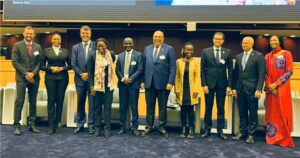Pursuing its efforts to promote and catalyse climate finance, especially in developing countries and emerging markets, Egypt as president of the 2022 UN Climate Change Conference (COP27) has taken unprecedented move by launching five regional roundtables with the aim of bringing climate projects and financing entities on one table. Within two month, investors, development banks, companies, international financing entities, and other stakeholders will be brought together in the regional roundtables, a matter that will help scale up climate projects and ensure just finance transition in the run-up to, during and beyond COP27.

What is unique about this initiative is that it links climate projects with finance. The roundtables are being held in co-operation with UN regional committees and UN high level climate champions.
The first roundtable took place in August 2-4 in Addis Ababa under the theme “Towards COP27: Africa Regional Forum on Climate Initiatives to Finance Climate Action”.
Africa forum discussed diverse issues including fulfilling previous COPs commitments to finance climate projects such as $100 billion pledged by Copenhagen conference, and $130 trillion pledged by GFANZ coalition.
The second roundtable will be held in Bangkok on August 25 for the Asia-Pacific region, while Santiago will host the third roundtable on September 1-2 for Latin America and the Caribbean.
The Arab world roundtable will take place in Beirut on September 15, while Geneva will host the last roundtable on September 20 for Europe.
Just, managed energy transition 
With less than 100 days to the United Nations Climate Change Conference (COP27), this forum brought together key stakeholders from both the public and private sectors, Zita Wilks, advisor at Gabon National Climate Council, said.
“This meeting was essential as Africa is at a significant disadvantage, with only 2 per cent of clean energy investment currently going to Africa. There is a fundamental mismatch between the projects on offer and the capital needed.
Hence, launching the forum is of paramount importance in order to support the necessary climate finance for Africa.”
She also stressed that the international community must show urgency and solidarity with developing countries, particularly in Africa which is least responsible for the problem but most vulnerable to the severe impacts of climate change.
As part of the Gabonese
National Climate, Wilks was commissioned to participate in this forum to understand the results of this round of regional roundtables that seek to discuss strategies for mobilising climate finance and engage the private sector to build climate resilience and promote 2063 and 2030 agendas for sustainable development.
“It was emphasised during the meeting that Africa needs to increase its investments exponentially to reach the $2.5 trillion in climate finance needed by 2030 to implement the Paris agreement.”
The discussions, she continued, clearly highlighted the pivotal role that the private sector will play in achieving a just and managed energy transition in Africa, taking into account the different starting points on the road to decarbonisation.
“The path forward must be clear; we must unite as public and private actors to ensure an inclusive and resilient recovery. We can create a better, greener and more inclusive future for Africa. It is within our grasp, but we need concrete willingness to act together.”
Meanwhile, Wilks stressed the need to think of long-term investments rather than short-term solutions.
“Unlocking access to climate finance, especially in emerging markets and developing economies, is crucial to closing the adaptation gap and protect the vulnerable from climate change.”
During the forum, Gabon was used as an example. With 88 per cent forest cover (23.5 million hectares), Gabon enjoys a special status as a high and low deforestation country (HLD) with the second-highest percentage of forest cover in the world (after Suriname).
This is primarily due to Gabon’s exceptional leadership and actions to protect its forests, she added.
Through sustainable policies and actions, Gabon is charting this course to increase its economic growth and become an emerging economy while conserving its natural ecosystems.
It is worth mentioning that Gabon is to host the African Climate Week where the focus will be on finance.
“This climate week will be a unique opportunity for our continent to bring together different stakeholders around the climate issue and related topics and to focus on accelerating financing implementation.”
Promising green projects

“Africa Regional Forum was an important step to highlight and identify promising pipeline green projects in Africa,” Kelvin Massingham, Director of Risk and Resilience at FSD Africa, told the Egyptian Mail.
The FSD Africa official also stressed the paramount importance of catalysing more private green investment in the lead up to COP27 and beyond, because more green finance ‘will have cross-cutting benefits beyond addressing the climate and biodiversity crises.’
‘It will create new jobs in fast-growing sectors, build resilience in African communities, and expand access to clean products and services,” he added.
Total annual climate finance flows in Africa currently fall far short of needs – in 2020 only 12 per cent of the amount needed as estimated by the Africa’s NDC’s.
Therefore, Massingham stressed the need to turn into investment transactions with much greater volumes of private capital flowing to reduce emissions, build climate resilience, and advance the Sustainable Development Goals.
“Sectors like renewable energy and carbon markets pose particularly attractive business cases for private investment going forward,” he noted.
In a related context, Massingham pointed out that in order to catalyse this investment, Africa must improve on the leverage of public climate funding, bearing in mind that at the moment only $4.2bn out of the $29.5bn of climate finance in Africa (2019/2020 average) is coming from the private sector. This means that every $1 of public money only crowds in 14 cents of private money. Globally, 50 per cent of climate finance comes from the private sector.
Addressing the closing session of Africa roundtable, Dr Mahmoud Mohieldin, UN Climate Change High Level Champion for Egypt, stressed that the upcoming four roundtables will build on the success of the first roundtable in Addis Ababa that managed to break barriers by bringing all climate actors under one roof.
Mohieldin hailed the outcomes of the African forum, saying that they helped find solutions and new mechanisms to scale up investments and finance of climate projects. In his speech, the climate champion also stressed that the projects and plans presented during the forum displayed that Africa has its climate solutions that will be showcased to the world in COP27.






Discussion about this post